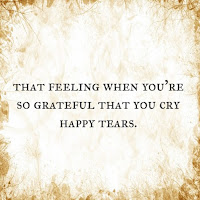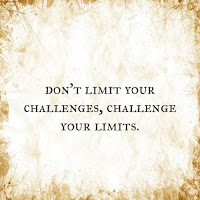Trying to find meaning, purpose and even joy in a life filled with chronic dizziness.
Tuesday, 21 July 2020
Tuesday, 14 July 2020
Going Beyond My Limits
A few days ago, I ran down my street with tears in my eyes. Okay fine, I was actually crying.
But I was crying because this was a very emotional moment and these were happy tears.
As some of you know, I used to be a marathon runner, and the last time I was able to run down my street was in the Fall 2017, when I was training for a marathon. That was before my back injury and before I was diagnosed with Vestibular Neuritis. The only 'running' I've done since then, has been wiping a runny nose and running a bath.
I'm not sure why I believed that running was no longer an option for me. I think it was in part due to fact I could barely walk straight and the constant dizziness. Both my disorder and my doctor had put physical limitations on me. But I also put limitations on myself.
In May I joined a new Facebook Group called 'Running Dizzy'. It is a group for runners with vestibular disorders. If i'm honest, I never really expected that I would run again, but I still loved all things running and wanted to stay connected to the running community.
Soon, some members of the group began to set small running goals for themselves. My goal was even simpler than that. I'd become quite sedentary and just wanted to walk a little bit each day.
While out on a walk one evening I actually attempted to run. I was only able to run for about 20 seconds, but to my surprise, I wasn't too dizzy, I didn't fall over and I didn't pass out.
So, the next time that I went for a walk, I tried running again. This time I was able to run for around 25- 30 seconds. Every time I went for a walk, I would try to do this. Eventually, I was able to sustain my running for about a minute at a time. I run very slowly and always try to centre myself before stopping. Running has become excellent vestibular therapy for me.
After a few weeks, I was walking less and running more.
By walking the same route at approximately the same time each day, I could measure my progress. Before long I could see improvement and I was starting to shave minutes off my walk each day. Now, minutes may not seem like a lot, but when you consider that professional athletes train really hard to shave seconds off their finishing time. And at the Olympics, it's often split seconds that is the difference between a podium finish and going home empty handed.
So, I will keep moving forward, and try to put less limitations on myself. I'm realizing I can still do some the things I used to enjoy. I just have to do it dizzy!
And the very next time I go for a walk...I will change the exercise setting from walk to 'RUN'!
Special thanks to Rhoda Watkins, for 'Running Dizzy'!
What limitations has your vestibular disorder put upon you? How can you try to go beyond your limits?
Thursday, 2 July 2020
The 'Upside' Of Down
People wrote jokes, memes and comedy skits. Then, the more musically minded, followed with parodies, virtual choirs and daily songs, called Quarantunes. The foodies and bakers created 'Quarantine-Cuisine'. Home workouts from the fitness fanatics showed us how we could "Stay Lean In Quarantine" . Quarantini's, Coronarita's and special beverages were created by the wine lovers. Virtual quiz nights, where friends divided into Quaranteams. Even activities aimed at bored youth, that could be found under the hashtag #Quaranteens. Each time I logged in, I would see yet another 'pandemic project' or online challenge.
Now, while all of this was highly entertaining, and somewhat amusing, I had to ask myself if any of it was really necessary? I mean really? I think the answer is both yes and no. These activities were not for our physical health and well being. Not at all - they didn't save lives. No, I believe this was all for our mental health.
I feel that all this creativity was just a coping strategy. It was a way for people to alleviate boredom and add some meaning to the mundane. A way for us to keep busy and stay positive in the face of such negativity. To make the best out of a bad situation. To find the 'upside' of lock down.
And that made me think:- if we can go to these extraordinary lengths, to preserve our emotional health and well being during a temporary lock-down , how much more so, should we use our creativity, when people are facing a lifelong lock-down. People who have a chronic illness or a vestibular disorder. People like me.
Recently, in one of my vestibular support groups, the admins invited the members to share their hobbies. What followed was a very long thread showcasing the artistic side, the creative side and the talents of the people within the group. I was completely blown away. I'd previously only seen one side of our group members. The vestibular disorder side. And yet there is so much more to us. We are more than our disorder.
The vestibular community is a strong community. We already know how to live through adversity and cope in a crisis. We do it every day. But perhaps we need to tap into our creativity a little more. Find our 'upside'.
Vestibular disorders can really take their toll. When I first got VN, I was feeling down about it for a long time. My symptoms were miserable, I was miserable and I was also miserable to live with (just ask my husband!). At the begining of this year, I made conscious decision to approach life differently. I couldn't change my condition, but I could change my mindset. So, I adopted a more positive outlook. And it's been a complete 180. Life looks different to what it did just a few months ago. My symptoms haven't changed, but the way I see them has. This isn't a PollyAnna mentality, it's just a shift of focus and a new perspective. I try to focus more on the things I can do rather than the things I can't do.
I revisited some of my old hobbies, but especially poetry. In fact, I got so involved with a creative writing project in April, that I almost forgot about my dizziness altogether. Finding my creative passion has made me feel a little better about myself, but also better within myself. I'm feeling better in general and I might even be a little nicer to live with (just ask my husband!).
When you shine a spotlight on your abilities rather than your disabilities, it can often give you a new sense of purpose and a new lease of life. It helps to highlight what is good in your life and filter out some of the bad. And it certainly adds a little sunshine to the dark and dreary days of life with chronic illness.
I've seen life from both sides of this disorder, and I can tell you, the view from the upside is way better!
Subscribe to:
Comments (Atom)













